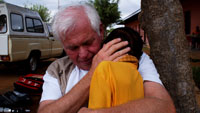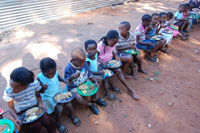
Food Freedom
Welcome to Food Freedom, a collection of blogs from a diverse group of individuals who celebrate the variety of food choices we enjoy today from different farming methods. Just as we all have different tastes in food, this collection of entries will include different perspectives about food and the importance of having food choice.
If you’d like to contribute to this blog, feel free to submit an entry to info@choose2choose.com. Entries should not endorse one type of food over another; rather, provide a balanced perspective that celebrates food choice and the issues surrounding it.
About Dr. Jim Blessman
Dr. Jim Blessman started his work in South Africa with his wife Beth in 2001 by forming Blessman Ministries, a nonprofit organization bringing hope to children through optical clinics, orphan villages, a feeding program, as well as sharing the love of Christ. The main objective of Dr. Jim and Beth as well as Blessman Ministries is to give these children physical and spiritual hope, by sharing their time, talent and treasure.
If you're interested in learning more about Blessman Ministries or Meals from the Heartland, please Choose 2 Give or visit the Blessman Ministries website.
As an Iowa native with deep agricultural roots and as someone who sees hunger firsthand, I feel the need to weigh in on the ongoing debate of whether Americans should play a part in “feeding the world.”
When I think of hunger in the world, I’m reminded of my rural Iowa upbringing, spending summers working on my uncle’s farm in Taylor County. Some of my best memories of growing up were from the long days I spent working in the hay fields on his farm. The work was grueling at times, but it was good for me and I somehow knew that even in my youth.
We’d start the day at sunrise milking cows and then spend a long day in the searing sun picking up dozens of hay bales. Though growing food was hard, it was fulfilling. I especially enjoyed the large thresher meals that my aunt would prepare for us.

I was so inspired by working with my hands and doing good for others that I got my medical degree. I now spend a good share of my time working with impoverished children in South Africa. There are many difficult situations that African children have to face.
One of the key issues in South Africa is chronic malnutrition or starvation. Many of the children are small for their age due to long-term underfeeding. They often tell me they come to school with no food in their bellies. There is obvious impairment in the intellectual performance associated with this starvation. They are more prone to disease; many literally starve to death.

Fortunately, with the help of many Iowans and organizations like Meals from the Heartland, our ministry is trying to address this issue by feeding 500 children a nutritious, hot meal every day. Our vision is to feed 1,000 children every day with meals provided from Iowa. Our hope is to ship one million meals each year to warehouses in Africa.
I watched as farming deteriorated in Zimbabwe just 200 miles to the North of our headquarters in Limpopo, South Africa. A few short years ago, Zimbabwe was the bread basket of Southern Africa just like Iowa is for our nation and the world. Farming has deteriorated to the extent that they are no longer able to feed even the people in their own country. Agriculture was the base of their economy and it has completely collapsed now.
I have similar concerns when I see restrictions put on our American farmers. When I was growing up, fertilizer and herbicides made the farms much more productive. Now, with biologic engineering, we have the opportunity to increase production while significantly decreasing the use of chemicals and conserving our natural resources.
I am quite supportive of the naturalists in our culture having access to organic farming techniques, but given what I see each day in Africa, I am opposed to trying to force this option upon the masses. This could have devastating consequences upon our ability to feed the world or possibly even our own country. The children in the United States and around the world need our help now; it will only get worse as our global population increases.
My hope is that we, as Americans, can come together and support all methods of farming, and be thankful for what we have. I invite you to come to South Africa and see what hunger truly does to a nation.




 choose 2 know your food
choose 2 know your food

